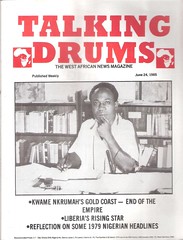How To Make A Million
A Touch Of Nokoko By Kofi Akumanyi
While having dinner of caviar and champagne and hob-nobbing with the Jet-setting class, signing big deals to bring in more millions, I was rudely awakened by my youngest daughter pulling my pyjamas in a fit of rage because she couldn't put the toothpaste on her toothbrush. What a thoroughly mundane thing to wake up to after a trip into the world of the rich and powerful!
Anyway, my nocturnal brush with money left one impression on me - a determination to have a feel of having millions of money in the bank and that's why I would like to meet a real flesh and blood millionaire. The last time I met one was about eight years ago but his claim to millions of dollars in banks in the United States of America and Switzerland was so hotly challenged that it became scandalous for anybody to support or believe him.
As a first step towards becoming a millionaire I have read a new book fresh from the press entitled "How to become a millionaire" written by someone appropriately called F. Rich (the initial 'F' presumably means 'Filthy').
It took me exactly 24 hours 55 minutes to read the 950-page book which says something about my anxiety and determination to get to the bottom of the mystery of becoming a millionaire. Well, I am none the wiser after the marathon reading because I only managed to learn that there are three ways to become rich: the illegal method through crooked deals then launder the money through genuine businesses, plain hard and honest work or simply being born with a golden spoon in the mouth - in other words, lucky.
Having pondered hard over these three methods I came to the sad conclusion that, decidedly, the easiest way is not through the straight and narrow path but the crooked way as the mafia has often demonstrated in television films. Consider the recent bank case in Ghana where three young men were convicted and executed for duping Ghana Commercial Bank of a hefty 56.8 million cedis - reputed to be the biggest fraud case in the nation's history. Here, we have young men using their 'ingenuity' to produce an elaborate plan to steal money that other people have worked hard to save.
On the other side of the coin in the same country, a 33-year-old businessman became an instant millionaire last week when he won 16.5 million cedis after staking a colossal sum of 69,000 cedis on the popular and highly patronised National Lotteries. The win is reportedly the biggest since the establishment of the Lotteries. It looks as if Ghanaians have been bitten by the million-cedis bug.
The question then arises: why is it that in a country like Ghana, with a highly educated elite and a crop of astute businessmen there are not many millionaires to speak of - at least not even "nouveau riche" millionaires? Does this mean that our society does not fit into the normal one in which relatives in it.. social mobility - upwards - is a sign of development of the human beings there in? I put the question to Professor Matthew Tutu of the Sociology Department of the City University who has done a considerable amount of work on the Ghanaian society, particularly, the motivations for personal developments, which in the final analysis, one could say, reflects on the general well-being of the nation.
"The country is being re-organised socially and on the economic front. Everybody says things are improving. Have you any ideas why corruption appears to be on the upward swing?"
"You mean why corruption is on the increase?"
"Right".
"Well, the first reason which readily comes to mind is the particularly abysmal handling of the exchange value of the currency which has will be introduced high inflation and subsequent high prices of all types of goods...
"Wait a minute. I don't understand the correlation between the exchange value..."
"You're not alone. The people who are in control of affairs don't understand it either", said Prof Tutu "but one thing is for sure, high prices have led to the lowering of the standard of living of millions of people".
"I didn't know about that".
"You wouldn't accept that there are a class of people who don't feel the pressure at all. They are living it up".
"You mean there are still people who have money to spare after the government's various measures to "mop off excess cedis from the system?" I asked, unable to control my surprise.
"You bet... There is also a group of people in Ghana today who, in spite of the apparent prosperity of some nouveau riches have been left in the lurch...'
"The members of the committee for the Defence of the Revolution?"
"No, the farmers."
"Why?"
"The Akuafo Cheque which was introduced with a lot of fanfare as the ultimate solution to the fraudulent practices in the cocoa industry has not lived up to expectations," Prof Tutu pointed out with an edge in his voice which gave the impression that either he operated a cocoa farm or had
"But Cocoa farmers are the mainstay of the economy".
"They are, except that nobody is cashing for them the cheques which are mere promisory notes".
"Why?"
"Because, the Banks don't have money to pay the farmers".
"Why, the other day some people made themselves instant millionaires by duping the same Commercial Banks of 56.8 million cedis which could have been used to pay the farmers".
"That's the irony of the whole situation; some individuals in Ghana are still OK while the majority are struggling to make ends meet".
"Do you think we've heard the last of the instant millionaires in the country?" "To tell you the truth, we have not. The economic situation will determine how and when one should adapt. There more millionaires yet - through fair or foul means".
